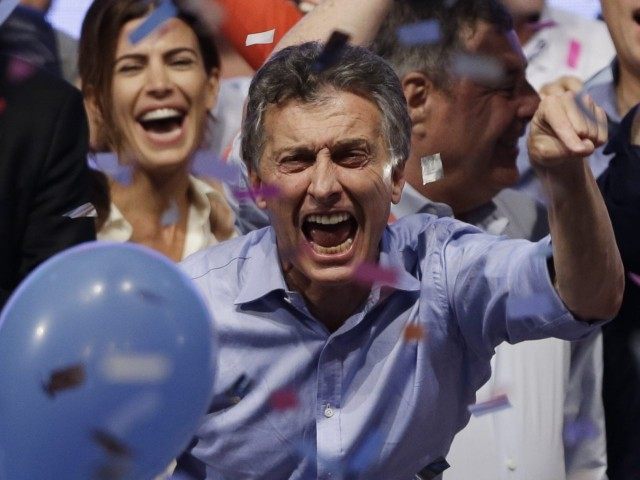The first political shock following the Paris bombings is the Argentine presidential election of conservative Mauricio Macri over the Peronist/Marxist ruling regime.
C5N News announced that polling showed the Kirchner-Fernandez clan’s 12-year iron grip on Argentina ended on November 22. The nation’s official election body said Macri had 54.5 percent support, and Peronist Front for Victory’s Daniel Scioli had 45.5 percent.
Argentina is a little less than half the size of the United States, with a huge subtropical belt known as the pampas. Due to a warm and extended growing-season, it is rated as the best beef and grain-growing region on earth. As a result, Argentina has exceeded the United States in cattle exports in a number of years.
The warm climate and fertile land encouraged a huge immigration from Western Europe. In the early 1900s Europeans referred to a wealthy person as someone who was “as rich as an Argentine.” In World War II, with a quarter of all the food in Britain being imported from neutral Argentina, Argentina was the second richest nation on the planet.
But all of that ended with the 1943 fascist military coup, and the three terms beginning in 1946 for Juan Perón as President. The military strongman squandered Argentina’s enormous wealth with a combination of radical social spending and blatant corruption.
Juan Perón bought thousands of tractors from the United States that no one needed; tried to start a jet fighter industry to compete with the United States; and threatened war with the British for the return of the Falkland Islands.
Perón announced to the world in 1951 that Argentina, after spending $400 million dollars financing alleged Nazi war refugee Ronald Richter, had beat the Soviets and the U.S. to create the world’s first “controlled thermonuclear fusion,” known as cold fusion.
The world panicked for about a month as rumors flew that nuclear proliferation was now in the hands of a Marxist military regime. The fusion claims turned out to be false, but Western nations retaliated by drastically restricting Argentine beef and grain imports.
With inflation skyrocketing and the economy in shambles, Peron was overthrown by the military in 1955. But since he founded the party in 1946, Peronist candidates have won 9 of the 11 Argentine Presidential elections when they were not banned from participating. Argentina also suffered serial defaults over the last six decades.
The Peronist Nestor Kirchner won in 2003, a year after Argentina defaulted on $132 billion of foreign debt. He broke with the International Monetary Fund and bondholders, expropriated private assets, and passed a “supply law” that gave the government the power to set price controls on goods sold in the country. Surprisingly, the economy had a dramatic turnaround. In 2007, he installed his wife Cristina Fernández as President.
President Fernandez de Kirchner set about further institutionalizing the state’s dominance by appointing Axel Kicillof as Minister of the Economy. According to the New York Times: “The rise of Mr. Kicillof, whose writings use Marxist concepts to interpret the work of the British economist John Maynard Keynes, points to efforts by the authorities to assert greater state control over Argentina’s economy at a time when growth is slowing significantly and inflation is soaring.”
Authoritarian control led to Argentina’s exports to Brazil, its largest trading partner, declining by about 27 percent between 2013 and 2014.
Suffering the third-highest inflation in the world at about 11 percent, Argentina defaulted on $20 billion of debt in August 2014. President Fernández de Kirchner responded by blaming lender greed for bondholders refusing to accept a 70 percent “haircut” of their debt.
With Argentina is being tormented with capital flight, high levels of public spending, and falling investment and exports crushing Argentina’s foreign currency reserves, President Macri’s Cambiemos coalition only holds 92 seats in the 257 seats National Legislature to the Peronist Front for Victory’s 109 seats. That means that Marci will have to negotiate with minority parties to gain a legislative majority until national elections in 2017.
The blowback from the terrorist bombings in Paris represents an existential threat to political power held by liberals, socialists and Marxists around the globe. The conservative political victory in Argentina could be the beginning of a major international political shift.

COMMENTS
Please let us know if you're having issues with commenting.